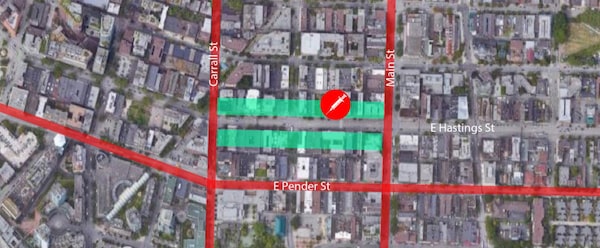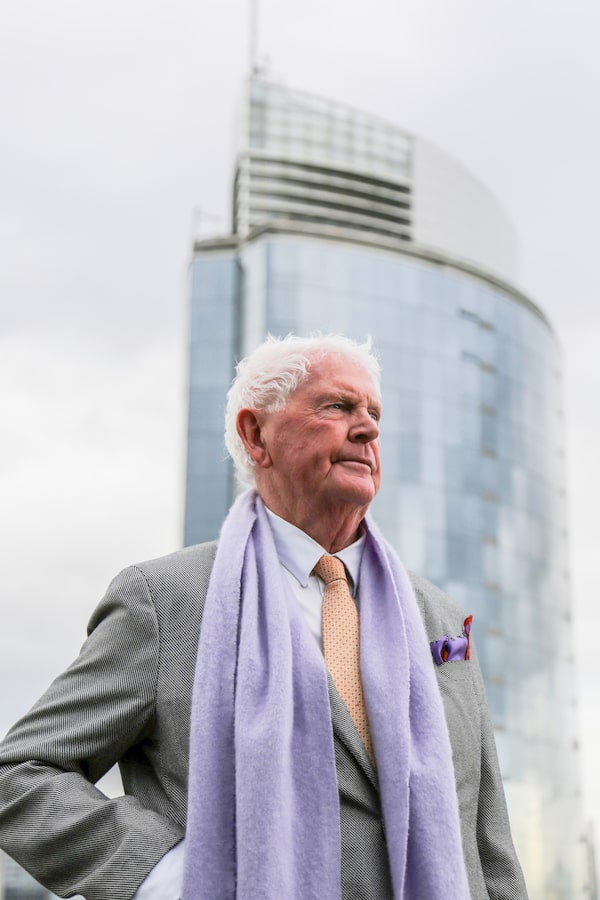
This map provided to the Globe and Mail by real estate developer Peter Wall shows the area of the Downtown Eastside he wants to help with his $1-million donation to the Vancouver Police Foundation.Courtesy of Peter Wall
A local real estate developer has donated $1-million to the Vancouver Police Department’s charity foundation in part to increase community policing in and around the Downtown Eastside, an area he says the city has failed with its misguided approach to drug use and homelessness.
But critics say such private bumps to police funding, which are common in bigger American cities and are increasing in Canada, prioritize the interests of the wealthy and come as municipalities across the country grapple with calls to put less – not more – money in the hands of police in favour of more services for those battling mental-health issues, homelessness and substance use.
Peter Wall, founder of the publicly traded Wall Financial Corp. and one of Vancouver’s most prominent political donors, says he recently made the five-year commitment to the Vancouver Police Foundation to help address the spike in fatal opioid poisonings and rise in homelessness that have been exacerbated by the COVID-19 pandemic. The charity funds programs run by officers and buys special equipment for officers each year, all outside of the annual operating budget of the policing agency.
Mr. Wall, whose buildings dot Vancouver’s skyline, declined an interview request from The Globe and Mail, but sent a small map of the area he deems problematic and a detailed statement that explained his donation while casting shade on the city’s response to these twin crises.
“Vancouver’s current city officials’ answer to the homeless problem for the people on the Downtown Eastside is to buy up or rent dilapidated old hotels that are rodent-infested and lack proper plumbing and heating, and their answer to mental health and addiction problems is to open more injection sites throughout the city where adults and youth can bring their contraband drugs which kill them,” he wrote.

Peter Wall is founder of the publicly traded Wall Financial Corp. and one of Vancouver’s most prominent political donors.Courtesy of Wall Financial Corp.
Each year, $100,000 of Mr. Wall’s money will go toward five community policing centres, most of which are located in and around the neighbourhood. Four of these outposts are overseen by non-profit boards that direct volunteers to prevent crime in co-operation with actual officers, while the VPD runs and funds the fifth, near the Granville Street entertainment district.
The other $100,000 in annual funding will be granted to various projects that “provide additional resources to VPD officers who are dealing with individuals in crisis due to mental health or addiction issues,” according to the police foundation’s executive director Andrea Wright. As an example of what types of projects may receive this funding, Ms. Wright pointed to a special centre in downtown Vancouver’s St. Paul’s Hospital that was created to help reduce the amount of time officers were waiting in the emergency room with people they arrested under the provincial Mental Health Act.
Kevin Walby, a criminology professor at the University of Winnipeg and an expert on North American police foundations, said Mr. Wall’s largesse is part of a concerning trend in Canadian policing that has long caught on in the United States, where most mid-sized and larger cities see corporations and the wealthiest locals donate millions each year to charity arms of the local department. In Calgary, he said, a host of oil companies has donated millions to the local police foundation, raising questions about whether police give more attention to areas around corporate property.
Prof. Walby said Mr. Wall’s donation is more problematic because he is directly requesting more policing of the Downtown Eastside, even if it is through the volunteer-run community policing centres. He said everyone wants their neighbourhoods to be safer, but putting more money toward securing the Downtown Eastside through law enforcement has failed to achieve this goal over the past decades.
“There’s no police agency in Canada that can stand up and say ‘Hey, we’ve been boosting security, boosting patrols, boosting criminalization and guess what? We’ve taken the crime rate down to zero,’ ” Prof. Walby said. “Donating directly to grassroots community and social development agencies, donating directly to the people who live and work in that community and letting them decide how to use the funds would be a way more insightful and mature way of approaching this.”
Mr. Wall’s pledge represents a tenth of the $10-million the Vancouver Police Foundation says it has given out since its creation in 1976. The donation – like all foundation grants – falls outside the city’s regular operating budget, which has devoted roughly a fifth of all spending on police services in recent years.
In December, city council narrowly passed a contentious $1.6-billion budget that froze funding this year for policing to 2020 levels of nearly $341-million. VPD Chief Adam Palmer said he was concerned that decision will directly affect public safety and his department will end up with 61 fewer new recruits than planned this year.
Vancouver Mayor Kennedy Stewart says he appreciates Mr. Wall’s philanthropy. But the mayor rejected the assertion that his city’s social-housing units are sub-standard, noting Vancouver is working with Ottawa on a $1-billion plan to buy up and revitalize older dorm-style hotels in the Downtown Eastside. He also denied that Vancouver’s approach to addiction harm reduction is misguided, given science that shows this range of services such as supervised drug-use sites have saved countless lives.
“There’s a great deal that’s happening that Mr. Wall may not be aware of, and I welcome the chance to tell him more about it and hopefully get his help to move it along,” Mr. Kennedy said in an e-mailed statement. “I am guided by science and by the best advice of medical experts.”
Vancouver Councillor Jean Swanson said city staff are now working to provide a template for how to replace police with different community groups to solve problems involving homeless people, sex workers, drug users and those with mental-health crises.
Ms. Swanson, a long-time advocate for Downtown Eastside residents, agrees with Mr. Wall that the city has not done enough to provide proper housing for those at the margins of society, but she vehemently opposes his prescription for more policing in the area.
“I don’t think it’s right that private rich people should be making decisions that get police to do what they want.”
Editor’s note: The headline and article stated a real estate developer had donated money to increase policing in the Downtown Eastside. This article has been updated to clarify that half of his donation is going to community policing centres, most of which operate in and around that neighbourhood. The other half will be disbursed through programs aimed at preventing crime and helping front-line officers.
We have a weekly Western Canada newsletter written by our B.C. and Alberta bureau chiefs, providing a comprehensive package of the news you need to know about the region and its place in the issues facing Canada. Sign up today.